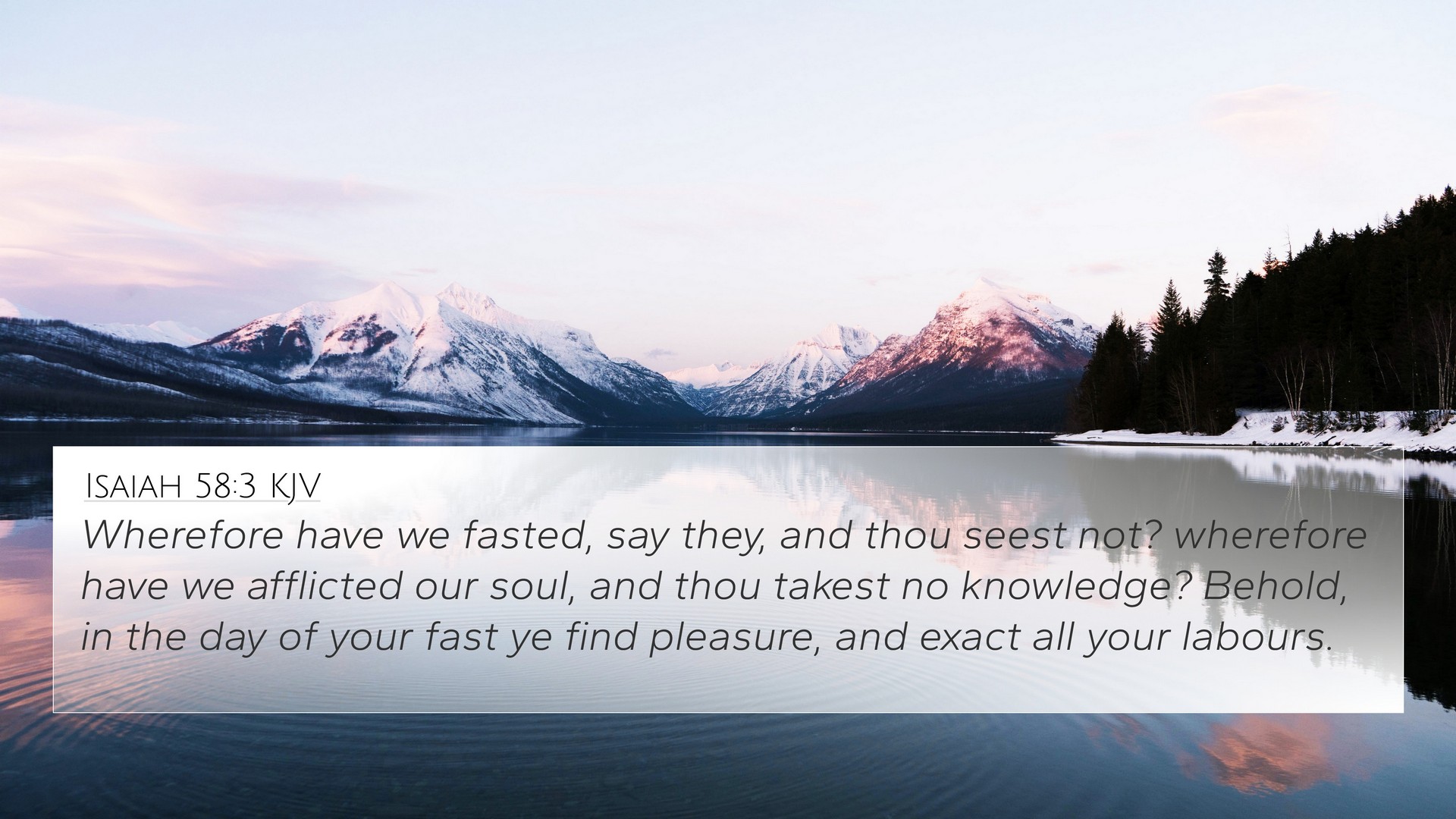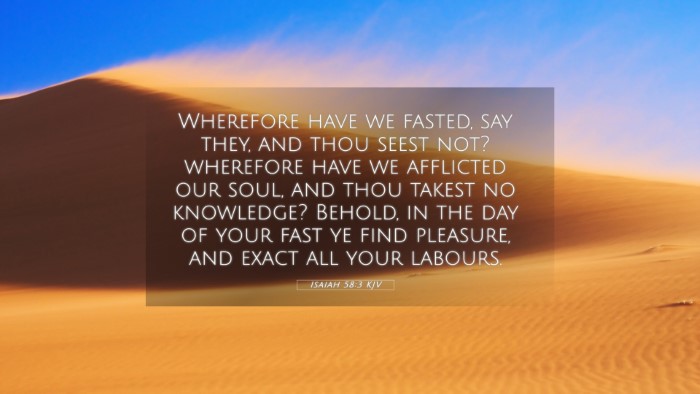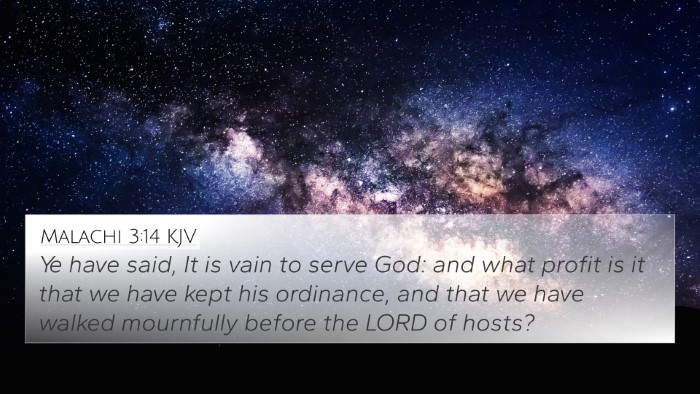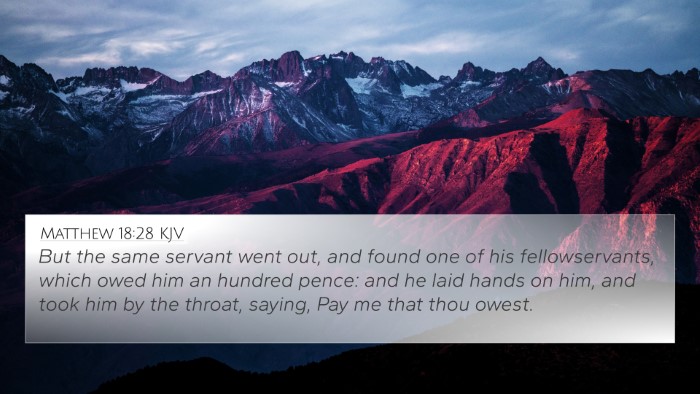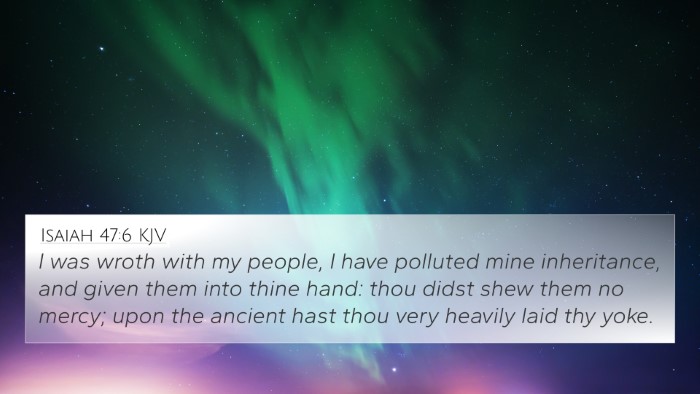Understanding Isaiah 58:3
Isaiah 58:3 states: "Wherefore have we fasted, say they, and thou seest not? wherefore have we afflicted our soul, and thou takest no knowledge?" This verse speaks volumes about the nature of true fasting and the heart behind acts of worship. Through insights from various public domain commentaries, we can gain a comprehensive understanding of this scripture and its implications in the life of believers.
Verse Context and Overview
The context of Isaiah 58 revolves around God’s response to the hypocritical practices of the Israelites who, while appearing pious, engaged in unjust behaviors. The people are inquiring why their fasting seemed ineffective, which prompts a response from God about the genuine spirit of worship.
Commentary Insights
Matthew Henry's Commentary
Matthew Henry highlights the contrast between outward religious observance and inward righteousness. He emphasizes that fasting should lead to a true reflection of one’s faith through acts of compassion and justice. He notes that God desires a heart aligned with His values rather than external forms that lack purposeful intent.
Albert Barnes' Notes
Albert Barnes points out that the question posed by the Israelites reflects a sense of confusion and disillusionment. He explains that their fasts were not met with God’s approval because they failed to address social injustices. Barnes underlines that true worship extends beyond ritualistic practices to embody ethical obligations toward others, affirming that God seeks a humble and contrite heart.
Adam Clarke's Commentary
According to Adam Clarke, the people’s complaint suggests a misunderstanding of God's expectations. Clarke indicates that their rituals, devoid of a compassionate spirit, missed the essence of divine service. He emphasizes that true fasting involves a commitment to social justice, especially helping the oppressed and vulnerable.
Key Themes in Isaiah 58:3
- Hypocrisy in Worship: The verse challenges believers to reflect on the authenticity of their religious practices.
- The Need for Justice: It underscores that faith without action, particularly regarding social equity, is insufficient.
- God's Desire for Sincerity: True worship is defined by a heart that seeks to align with God's will rather than mere rituals.
Bible Verse Cross-References
To fully grasp the message of Isaiah 58:3, it’s beneficial to explore related scriptures that reinforce its themes:
- Matthew 6:16-18: Jesus teaches about the attitude in fasting, advocating for sincerity over outward displays.
- James 1:27: Explores religion that God regards as pure, focusing on caring for orphans and widows.
- Micah 6:8: "What does the Lord require of you? To act justly, love mercy, and walk humbly with your God." This mirrors the sentiments of genuine faith.
- Lamen 3:40: Encourages self-examination, aligning well with the introspection called for in Isaiah.
- Proverbs 21:3: Highlights that doing righteousness and justice is more acceptable to God than sacrifice.
- Isaiah 1:17: God commands His people to seek justice and help the oppressed, aligning with the message in chapter 58.
- Luke 18:9-14: The parable of the Pharisee and the tax collector highlights the importance of humility and true repentance in worship.
Connections Between Bible Verses
The links between these verses extend a deeper understanding of the collective message of the Bible regarding true worship. They reflect a theme of harmony between faith and action that is prevalent across both testaments. Isaiah’s proclamation resounds through the teachings of Jesus and the apostles, emphasizing that outward worship must stem from a heart committed to loving others.
Thematic Bible Verse Connections
The themes present in Isaiah 58:3 are critical for understanding the nature of a faithful believer. They remind us that:
- Faith is active and has a societal aspect.
- Fasting and prayer without compassion for others are empty.
- The essence of worship lies in our relationships with each other and with God.
Tools for Cross-Referencing Biblical Texts
To explore the interconnections of Bible verses like Isaiah 58:3, believers can utilize various tools:
- Bible concordance: A useful resource to find specific keywords and phrases across scriptures.
- Cross-reference Bible study guide: Helps in identifying the relationships and thematic links between passages.
- Bible chain references: These systems provide a sequence of verses connected thematically.
Concluding Thoughts
Isaiah 58:3 challenges us to reconsider how we approach our religious lives. By integrating lessons from Matthew Henry, Albert Barnes, and Adam Clarke, we find a unified message: God desires a heart that practices justice and compassion above empty rituals. Through effective Bible cross-referencing, believers can enrich their understanding and engage in a more fulfilling faith.
